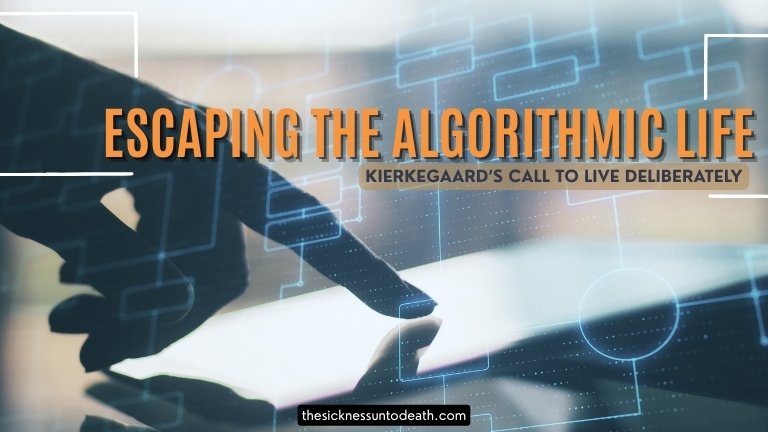Scroll. Tap. Swipe. Like.
Repeat.
It’s a rhythm most of us follow without thinking. The feed decides what we see, what we buy, what we believe—and slowly, without realising it, we begin to live on autopilot.
But what happens when the algorithm knows us better than we know ourselves?
Søren Kierkegaard, writing in the 1800s, couldn’t have predicted the digital age. But his warning still rings loud and clear: if we’re not careful, we become shaped by the crowd—by the external—at the cost of our inward self.
In a world of digital distraction and algorithmic control, Kierkegaard calls us back to a life of depth, reflection, and deliberate faith.
The Age of Passive Living
Let’s be honest: it’s easier to consume than to reflect. Easier to scroll than to sit in silence. Easier to follow trends than to ask what I truly believe?
But Kierkegaard was never one for easy answers.
He believed that real living begins when we choose to stand apart from the crowd—when we stop being defined by what others expect, and instead begin to ask who we are in relation to God.
“The crowd is untrue.”
That’s one of his most famous lines. And in the age of algorithms, it’s never been more relevant.
How the Algorithm Shapes the Soul
Today, your feed is personalised—but not for your soul. It’s tailored to keep you hooked, not to help you grow. And over time, it can quietly distort how you think, what you value, and even who you think you are.
- You start chasing visibility instead of meaning.
- You compare yourself to people you’ve never met.
- You base your self-worth on hearts, likes, and shares.
It’s not always obvious. But deep down, you start to feel disconnected—from yourself, from others, and from God.
Kierkegaard would call this a form of despair—the kind that doesn’t scream, but simmers beneath the surface.
Choosing a Life of Inwardness
For Kierkegaard, the solution isn’t to abandon the world—it’s to live inwardly within it. That means pausing. Questioning. Reflecting. It means choosing faith over passivity, and truth over trends.
He believed that our true identity is found not in how others see us, but in how we relate to God. And that kind of relationship isn’t algorithm-friendly—it requires silence, solitude, and intentionality.
“The thing is to understand myself… to find a truth which is true for me.”
That doesn’t come from a scroll. It comes from stillness.
Living Deliberately in a Digital Age
If you’ve ever caught yourself scrolling mindlessly, or felt your day shaped more by your feed than your faith—you’re not alone.
But you can step back.
You can choose to:
- Ask yourself what matters most
- Make space for silence and reflection
- Practise presence instead of performance
- Seek truth that’s deeper than the algorithm
That’s what Kierkegaard meant by living deliberately—not perfectly, but purposefully.
Final Thoughts: You’re More Than a Data Point
Kierkegaard’s invitation is simple, but powerful:
Don’t let the world define you.
Choose who you are becoming—on purpose.
In a time when it’s easy to let algorithms decide what we value, faith becomes an act of resistance. It’s the decision to live from the inside out, not the outside in.
Because you’re not a product.
You’re a person.
And your soul deserves more than a scroll.
Go Deeper
📖 Visit www.thesicknessuntodeath.com
Explore a modern, accessible translation of The Sickness Unto Death—Kierkegaard’s timeless reflection on selfhood, despair, and what it means to live truly and faithfully in a distracted world.
If you’ve been feeling overwhelmed by noise, disconnected from your purpose, or hungry for something deeper—this is a good place to begin.
Not with a new algorithm. But with a question:
Am I living deliberately?

